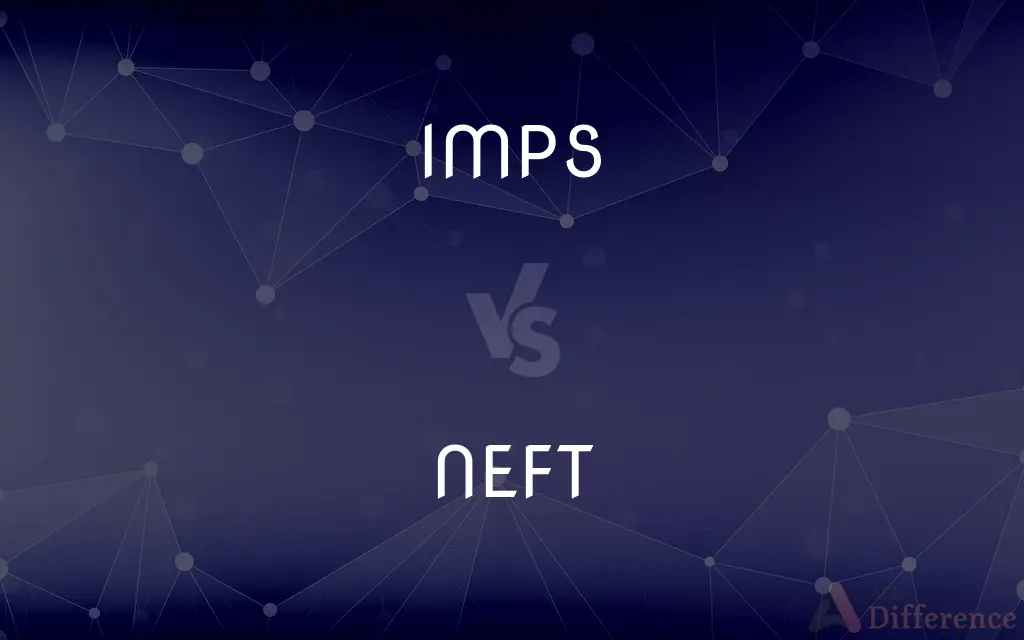IMPS vs. NEFT — What's the Difference?
By Tayyaba Rehman — Published on December 14, 2023
IMPS offers real-time fund transfer, while NEFT operates in timed batches. Both are electronic fund transfer systems in India.

Difference Between IMPS and NEFT
Table of Contents
ADVERTISEMENT
Key Differences
Functionality and Speed: IMPS provides an instant, 24/7 money transfer service, ensuring that transactions occur in real-time. On the other hand, NEFT operates in hourly batches during designated hours, which means transfers might not be instant.
Operational Hours: IMPS operates around the clock, allowing users to make transfers any time, including weekends and holidays. NEFT, in contrast, has specific operational hours and doesn’t usually function 24/7 or on bank holidays.
Transaction Limits: IMPS generally has a different set of transaction limits compared to NEFT. While both methods allow significant amounts to be transferred, IMPS might have a lower ceiling due to its instantaneous nature.
Beneficiary Addition: For IMPS, the beneficiary's account is typically approved almost instantly, facilitating quicker transfers. For NEFT, there might be a waiting period after adding a new beneficiary before funds can be transferred.
Use Cases: IMPS, given its real-time functionality, is often preferred for urgent transactions. NEFT, being a batch-based system, is usually chosen for non-urgent transfers or for transactions that involve larger amounts.
ADVERTISEMENT
Comparison Chart
Transfer Speed
Real-time transfer
Timed batch transfers
Operational Hours
24/7
Specific operational hours, not 24/7
Transaction Limits
Usually lower limits compared to NEFT
Higher transaction limits
Beneficiary Addition
Almost instant approval
Might have a waiting period
Primary Use Cases
Urgent transfers
Non-urgent or larger transactions
Compare with Definitions
IMPS
A real-time interbank payment system.
For immediate payments, I always rely on IMPS.
NEFT
An electronic funds transfer system in India operating in timed batches.
I transferred money using NEFT and it was credited during the next batch timing.
IMPS
A secure and instant mode of money transfer between banks.
I prefer IMPS when I need to instantly pay someone through bank transfer.
NEFT
A reliable electronic mode for scheduled bank-to-bank transfers.
I scheduled my payment through NEFT for the next operational slot.
IMPS
An instant payment system for interbank transfers in India.
I used IMPS to quickly send money to my friend's bank account.
NEFT
A banking system for interbank money transfer in scheduled slots.
I use NEFT for transactions when I'm not in a hurry.
IMPS
A 24/7 electronic fund transfer method.
With IMPS, I can send money even during weekends and holidays.
NEFT
An Indian interbank transfer system with designated timings.
When transferring large amounts, I often opt for NEFT.
IMPS
A digital method for immediate monetary transactions.
IMPS ensures that the recipient gets the money within minutes.
NEFT
A digital payment method that operates in fixed time intervals.
NEFT ensures my payments are processed during its operational hours.
Common Curiosities
Which method is quicker?
IMPS is instantaneous, while NEFT depends on batch timings.
Can I use NEFT for immediate transactions?
NEFT operates in batches during specific hours, so transfers might not be immediate.
Are there transaction fees for both methods?
Both IMPS and NEFT might have associated transaction fees, which vary based on the bank and the transaction amount.
Is IMPS available 24/7?
Yes, IMPS operates 24/7, including weekends and holidays.
Is there a limit to how much I can transfer using IMPS?
Yes, IMPS has transaction limits, which might vary based on the bank.
Can I schedule future payments using NEFT?
NEFT transactions are processed in the next available batch, so they can't be scheduled for a future date.
What's the primary difference between IMPS and NEFT?
IMPS offers real-time fund transfers, whereas NEFT operates in timed batches.
Can I use both methods for international transfers?
Both IMPS and NEFT are primarily for domestic transfers within India.
Which method should I use for large transactions?
While both methods are reliable, NEFT is often preferred for very large amounts.
How safe are IMPS and NEFT?
Both IMPS and NEFT are secure electronic fund transfer methods regulated by the Reserve Bank of India.
Is there a maximum limit for NEFT transactions?
NEFT limits might vary based on the bank, but generally, it has higher limits compared to IMPS.
Are there any beneficiary addition delays in IMPS?
IMPS typically allows almost instant beneficiary addition.
How do I know the status of my NEFT transaction?
Banks usually provide a transaction reference number, which can be used to track the status of your NEFT transaction.
How long does it take for a NEFT transaction to be processed?
NEFT transactions are processed in the next available batch, so the time can vary based on when the transaction is initiated.
Do all banks in India support IMPS and NEFT?
Most major banks in India support both IMPS and NEFT.
Share Your Discovery

Previous Comparison
JSP vs. Servlet
Next Comparison
NBFC vs. BankAuthor Spotlight
Written by
Tayyaba RehmanTayyaba Rehman is a distinguished writer, currently serving as a primary contributor to askdifference.com. As a researcher in semantics and etymology, Tayyaba's passion for the complexity of languages and their distinctions has found a perfect home on the platform. Tayyaba delves into the intricacies of language, distinguishing between commonly confused words and phrases, thereby providing clarity for readers worldwide.
















































